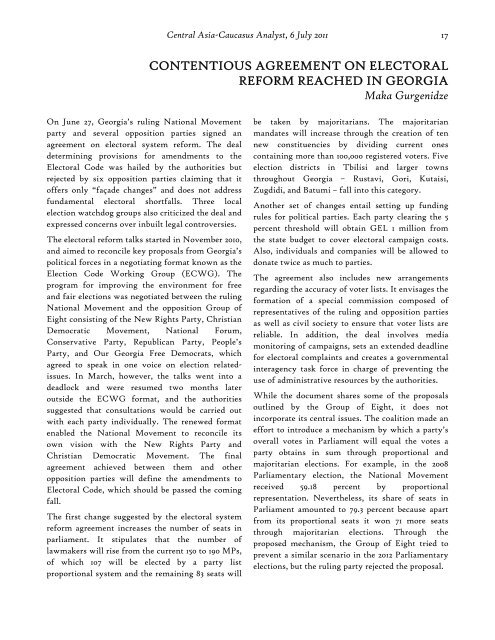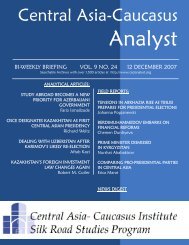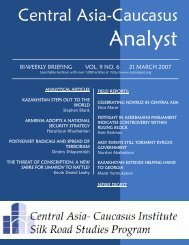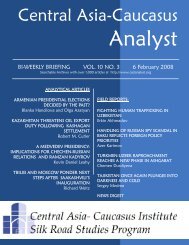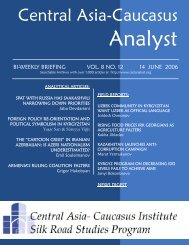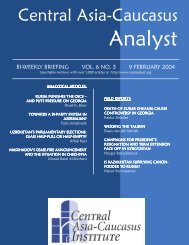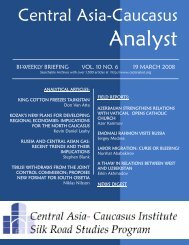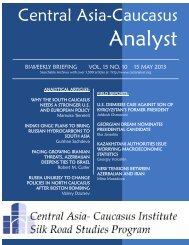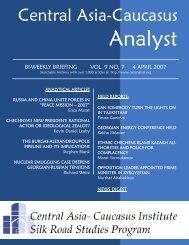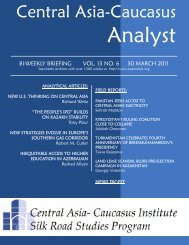No. 13, July 7 issue - Central Asia-Caucasus Institute and Silk Road ...
No. 13, July 7 issue - Central Asia-Caucasus Institute and Silk Road ...
No. 13, July 7 issue - Central Asia-Caucasus Institute and Silk Road ...
Create successful ePaper yourself
Turn your PDF publications into a flip-book with our unique Google optimized e-Paper software.
<strong>Central</strong> <strong>Asia</strong>-<strong>Caucasus</strong> Analyst, 6 <strong>July</strong> 2011 17<br />
CONTENTIOUS AGREEMENT ON ELECTORAL<br />
REFORM REACHED IN GEORGIA<br />
Maka Gurgenidze<br />
On June 27, Georgia’s ruling National Movement<br />
party <strong>and</strong> several opposition parties signed an<br />
agreement on electoral system reform. The deal<br />
determining provisions for amendments to the<br />
Electoral Code was hailed by the authorities but<br />
rejected by six opposition parties claiming that it<br />
offers only “façade changes” <strong>and</strong> does not address<br />
fundamental electoral shortfalls. Three local<br />
election watchdog groups also criticized the deal <strong>and</strong><br />
expressed concerns over inbuilt legal controversies.<br />
The electoral reform talks started in <strong>No</strong>vember 2010,<br />
<strong>and</strong> aimed to reconcile key proposals from Georgia’s<br />
political forces in a negotiating format known as the<br />
Election Code Working Group (ECWG). The<br />
program for improving the environment for free<br />
<strong>and</strong> fair elections was negotiated between the ruling<br />
National Movement <strong>and</strong> the opposition Group of<br />
Eight consisting of the New Rights Party, Christian<br />
Democratic Movement, National Forum,<br />
Conservative Party, Republican Party, People’s<br />
Party, <strong>and</strong> Our Georgia Free Democrats, which<br />
agreed to speak in one voice on election related<strong>issue</strong>s.<br />
In March, however, the talks went into a<br />
deadlock <strong>and</strong> were resumed two months later<br />
outside the ECWG format, <strong>and</strong> the authorities<br />
suggested that consultations would be carried out<br />
with each party individually. The renewed format<br />
enabled the National Movement to reconcile its<br />
own vision with the New Rights Party <strong>and</strong><br />
Christian Democratic Movement. The final<br />
agreement achieved between them <strong>and</strong> other<br />
opposition parties will define the amendments to<br />
Electoral Code, which should be passed the coming<br />
fall.<br />
The first change suggested by the electoral system<br />
reform agreement increases the number of seats in<br />
parliament. It stipulates that the number of<br />
lawmakers will rise from the current 150 to 190 MPs,<br />
of which 107 will be elected by a party list<br />
proportional system <strong>and</strong> the remaining 83 seats will<br />
be taken by majoritarians. The majoritarian<br />
m<strong>and</strong>ates will increase through the creation of ten<br />
new constituencies by dividing current ones<br />
containing more than 100,000 registered voters. Five<br />
election districts in Tbilisi <strong>and</strong> larger towns<br />
throughout Georgia – Rustavi, Gori, Kutaisi,<br />
Zugdidi, <strong>and</strong> Batumi – fall into this category.<br />
Another set of changes entail setting up funding<br />
rules for political parties. Each party clearing the 5<br />
percent threshold will obtain GEL 1 million from<br />
the state budget to cover electoral campaign costs.<br />
Also, individuals <strong>and</strong> companies will be allowed to<br />
donate twice as much to parties.<br />
The agreement also includes new arrangements<br />
regarding the accuracy of voter lists. It envisages the<br />
formation of a special commission composed of<br />
representatives of the ruling <strong>and</strong> opposition parties<br />
as well as civil society to ensure that voter lists are<br />
reliable. In addition, the deal involves media<br />
monitoring of campaigns, sets an extended deadline<br />
for electoral complaints <strong>and</strong> creates a governmental<br />
interagency task force in charge of preventing the<br />
use of administrative resources by the authorities.<br />
While the document shares some of the proposals<br />
outlined by the Group of Eight, it does not<br />
incorporate its central <strong>issue</strong>s. The coalition made an<br />
effort to introduce a mechanism by which a party’s<br />
overall votes in Parliament will equal the votes a<br />
party obtains in sum through proportional <strong>and</strong><br />
majoritarian elections. For example, in the 2008<br />
Parliamentary election, the National Movement<br />
received 59.18 percent by proportional<br />
representation. Nevertheless, its share of seats in<br />
Parliament amounted to 79.3 percent because apart<br />
from its proportional seats it won 71 more seats<br />
through majoritarian elections. Through the<br />
proposed mechanism, the Group of Eight tried to<br />
prevent a similar scenario in the 2012 Parliamentary<br />
elections, but the ruling party rejected the proposal.


